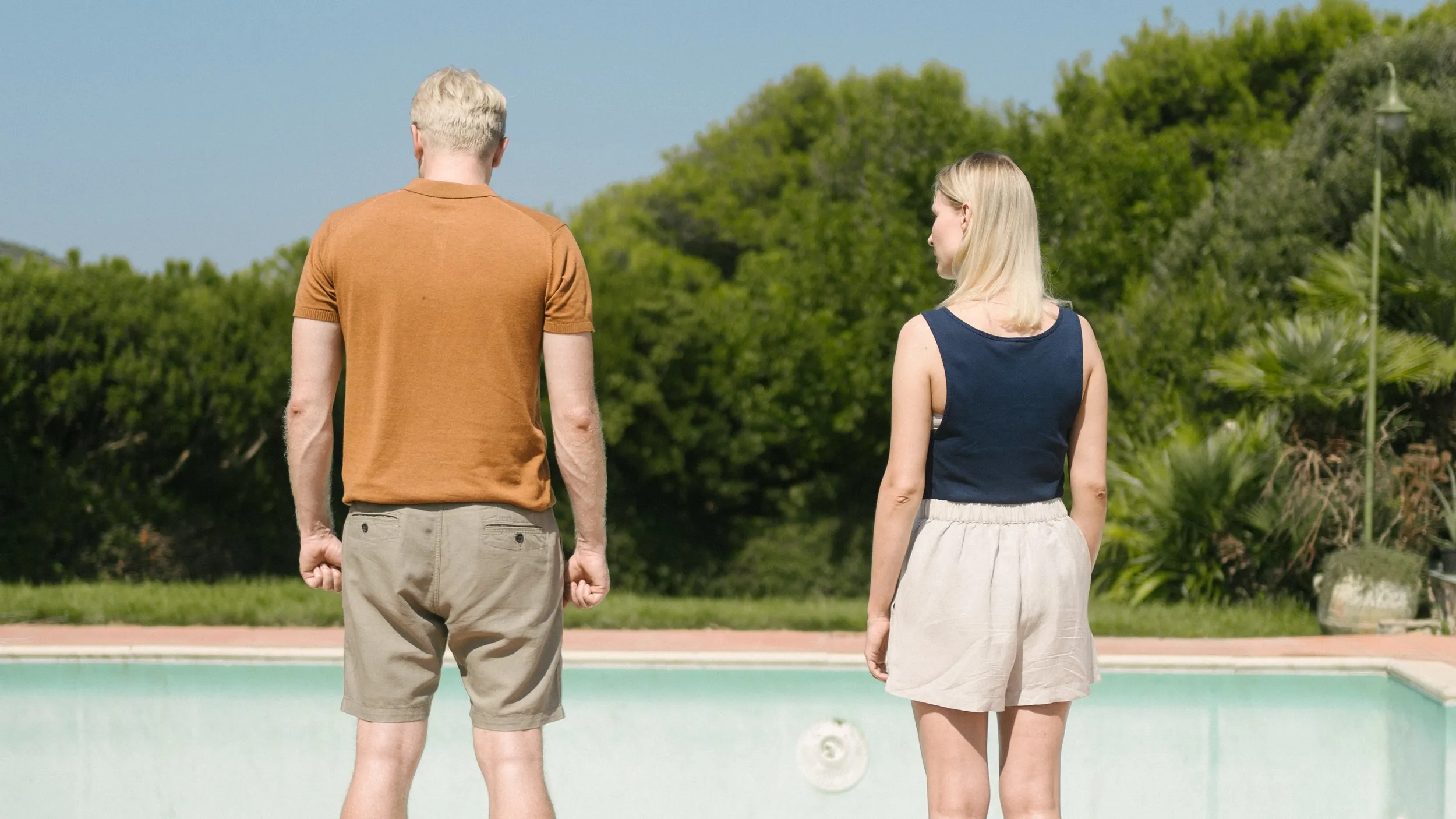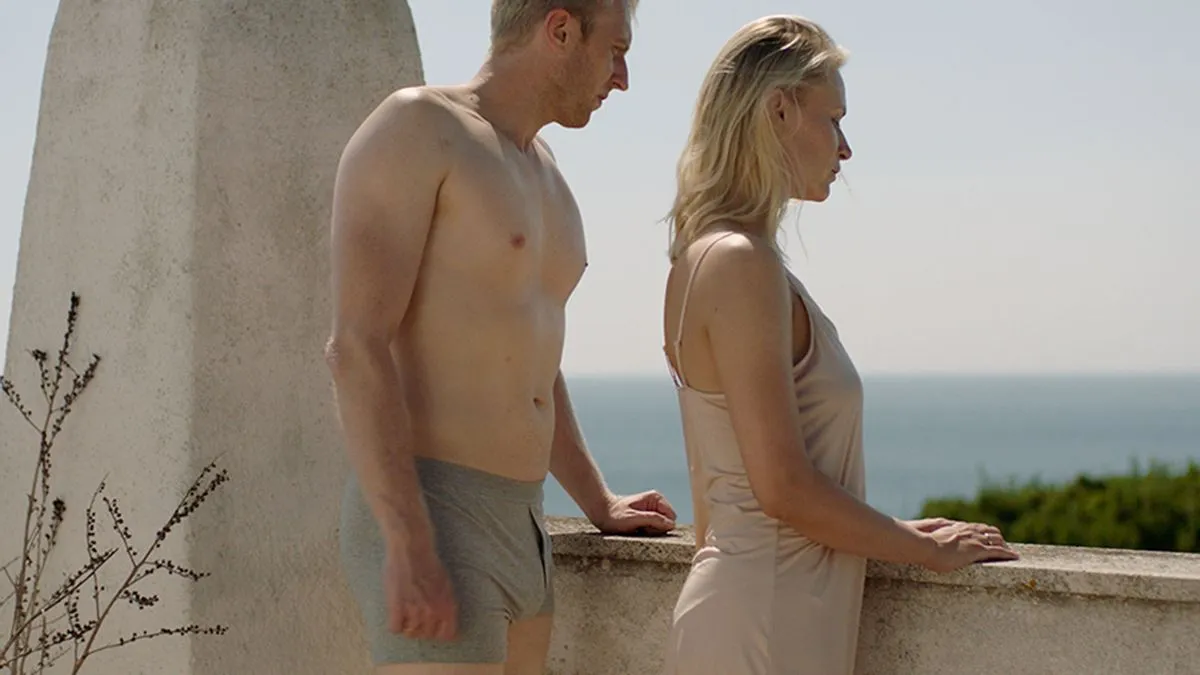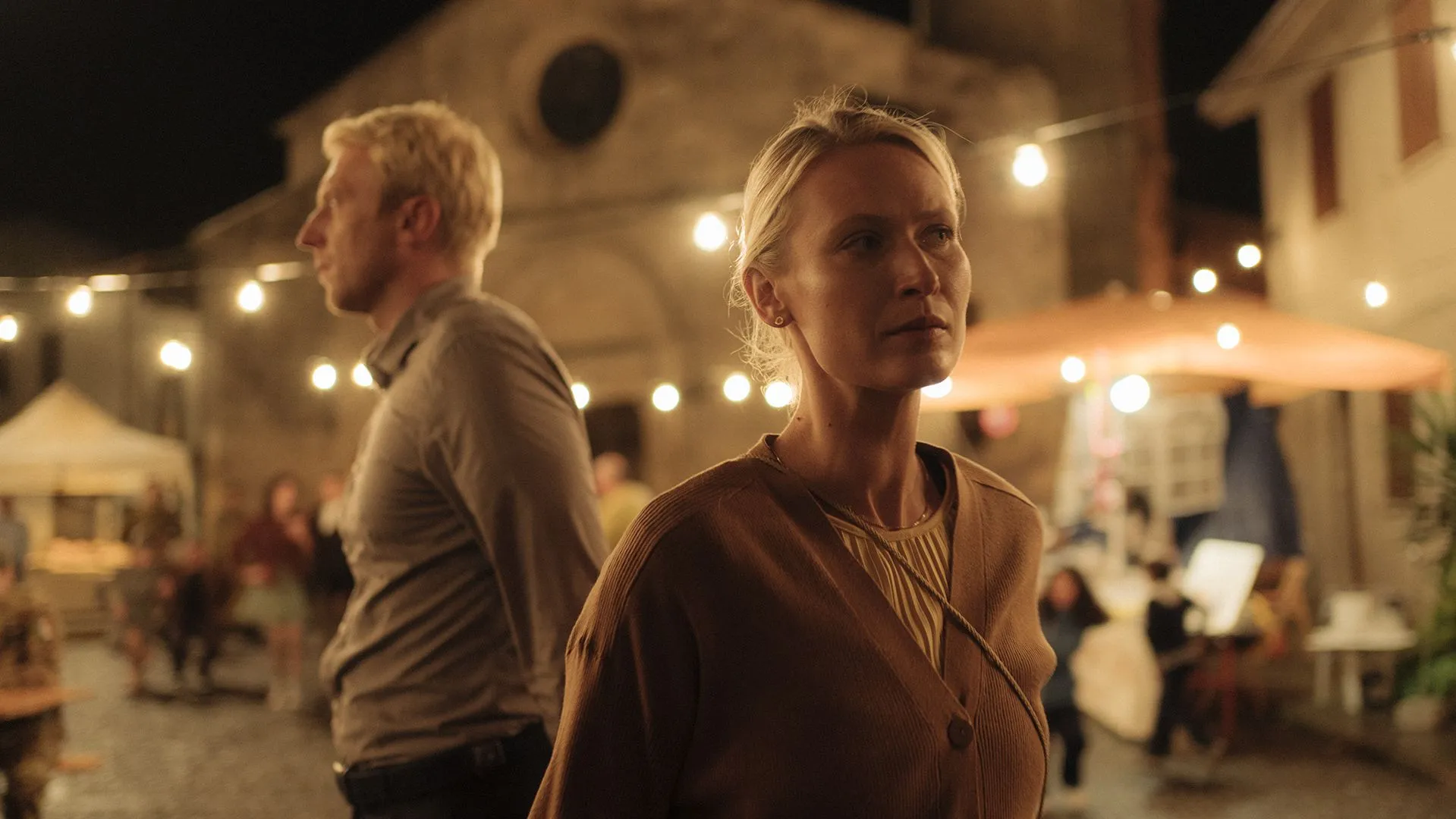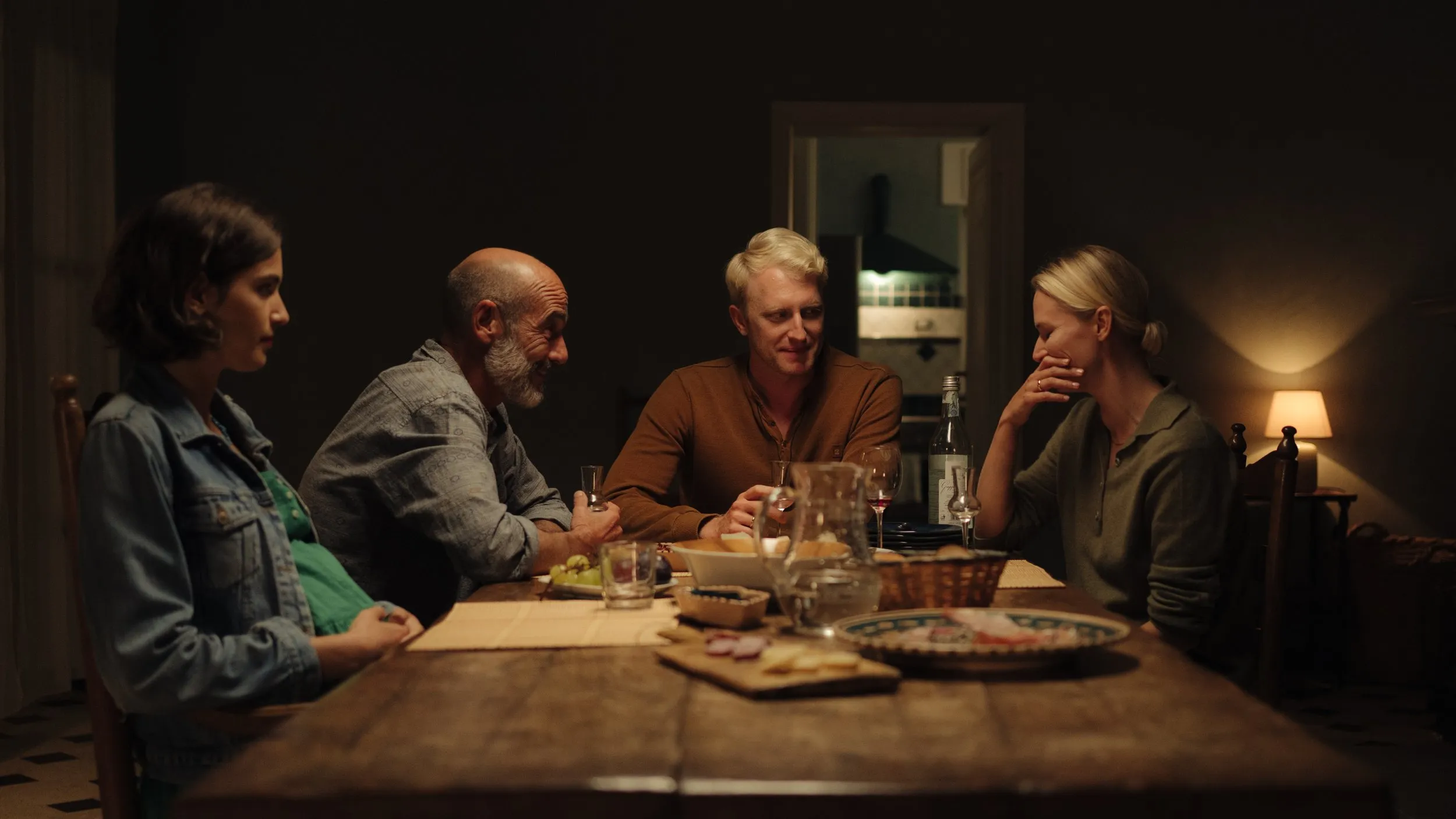Aga Woszczynska’s debut feature film Silent Land takes viewers to the sun-soaked shores of Sardinia, Italy. Released in 2022, the movie stars Agnieszka Zulewska and Dobromir Dymecki as Anna and Adam, a Polish couple seeking relaxation on their Italian getaway. But moments after arriving at their luxurious villa rental, cracks begin to emerge in their perfect vacation setup.
The pool, a centerpiece of their seaside retreat, is out of order. After negotiating with the landlord to have it repaired quickly, Anna and Adam settle back to leisurely days lounging by the water. Their response is disrupted by the arrival of a contractor, Rahim, tasked with fixing the problem.
As his work gets underway, a tragic accident throws the couple’s relationship into turmoil. Rahim takes a fall in the empty pool and doesn’t resurface. Anna and Adam look on, shocked yet removed from the emergency unfolding before them.
In Silent Land, director Woszczynska unveils the façade of privilege through her main characters’ reaction to this crisis. As pressure mounts from authorities investigating the incident, faults in the couple’s ideals of flawless luxury and detachment from complications are revealed. Their vacation bliss shattered; Anna and Adam must now face hard truths about morality, empathy, and the transience of a gilded lifestyle.
Capturing Privilege on Film
Silent Land transports viewers to the stunning shores of Sardinia, Italy. Director Aga Woszczyńska’s camera swoops across rolling green hills brushing azure waters. We’re immersed in the natural splendor of the countryside. It’s easy to understand the appeal for tourists seeking relaxation.
The villa rented by the movie’s Polish couple, Anna and Adam, enhances the feel of opulence. Wide interior shots showcase sleek modern furnishings against whitewashed walls. Floor-to-ceiling windows perfectly frame the lush landscape outside. Subtle touches like folded piles of high-end clothing and stocked refrigerators fill out the portrait of privilege.
Our protagonists dress the role too. Anna and Adam sport crisp attire and swimwear in muted pastels. Their pristine garb stands in contrast to the contractor sent to repair the pool. Rahim’s worn trousers and bare muscular torso signal his working-class status. This distinction in attire underscores the divide between the vacationing elite and the locals who sustain their vacation fantasy.
Behind the camera, cinematographer Bartosz Swiniarski seizes on the natural beauty. Yet his roving lens soon strips away idyll. As the accident upends privilege, lighting shifts from bright sunshine to darker tones. Drone shots capture Anna and Adam like ants amid the sprawling scenery, emphasizing their smallness. In troubling later scenes, tight close-ups peer into fissures opening within the couple.
Through its stunning imagery and consideration of visual details, Silent Land paints a photo of leisure built on imbalance. Its gorgeous setting served to conceal fault lines ultimately laid bare.
Finding Fault in Perfection
We’re introduced to Anna and Adam as the picture of happiness—gorgeously tan and toned from holidays in the sun. Renting a scenic villa in Sardinia, they glide through routines of exercise and relaxation without a care. But beneath the gloss lies fragility we don’t yet see.
Agnieszka Zulewska and Dobromir Dymecki breathe life into these characters. Early scenes depict a close bond where words aren’t needed. Strolls on the beach speak volumes about their intimacy. But as trouble arises, cracks emerge. Dymecki subtly shifts from contentment to agitation, simmering resentment in Adam’s formerly cheerful mien.
Zulewska, meanwhile, unravels Anna’s unflappable facade to reveal the fault lines. Uncertainty clouds her eyes and stiffens her posture in uncomfortable socializing. We sense fragility that contradicts her poised outward persona. Neither escapes the ordeal unchanged as the script chips away at their self-image.
Supporting figures highlight class divides. Landlord Fabio, played suavely by Marcello Romolo, displays the oily charm of someone who profits from privilege while keeping “the help” invisible. Police too prioritize tourism, shooing away concerns with empty promises so vacationers face no disruption.
Only the builder Rahim, in a brief but impactful turn from Ibrahim Keshk, disrupts perceptions. His rugged physique threatens the couple’s sense of control. Reminders of a world beyond their idyll unsettle comfortable assumptions. Ultimately, the performances uncover how even seemingly perfect lives contain fault lines laid bare under pressure.
A Wake-Up Call by the Pool
The couple’s idyllic escape takes a turn when an accident shakes their holiday. We witness builder Rahim working by the unfinished pool when he suddenly slips and falls in, unable to resurface. Anna and Adam happen upon the scene yet seem transfixed by an odd curiosity more than concern.
One can almost see their minds attempting to process what’s unfolding. Privilege has insulated them from tragedy’s raw ferocity, leaving them ill-equipped to act. A life hangs in the balance mere feet away, yet they stand motionless—more bothered voyeurs than witnesses to a fellow human’s desperate plight.
In the aftermath, doubt creeps in. Questions they’d rather ignore start nagging for answers. Why did nothing inside compel them to help? Are lives beyond their own so easily dismissed? Back in town, insensitive questioning adds to their unease. Dark thoughts swirl as attempts to rationalize their reaction feel increasingly hollow.
The fault lines in their relationship also start widening. Blame and deflection strain what was once unspoken understanding. Neither escapes unchanged as harsh realities penetrate their fantasy. This secluded getaway spot where cares melted away now becomes a place that can’t outrun their guilty consciences—or the eyes of a security camera capturing what they wish to forget.
By the pool’s edge, their worlds were shaken to the core. Nothing will feel quite the same again in the place they came seeking simplicity and rest. Uncomfortable truths have surfaced, forcing change upon a couple who’d grown too used to life’s comforts, shielding them from life’s hard edges.
Trouble in Paradise
The idyllic vacation these two sought is fading fast. As doubts creep in about that day by the pool, tensions between Anna and Adam come boiling to the surface.
We see it first in little ways—snaped comments that lack their usual playfulness, gazes that linger with accusation rather than affection. Their routines now feel empty rather than relaxing. Jogging alongside the sea holds no joy, and evenings meant for romance end in friction.
Major cracks start showing during a run-in with locals. Eager to salvage their image, Anna spins a tale of her husband’s bravery to new friends—but it’s a story Adam knows isn’t true. The dig at his failure to act plainly angers him.
From there, distrust infects even lighthearted moments. Seeing Anna dance with laughter at a festival unleashes Adam’s insecurities, and he pulls her away roughly to interrogate her version of events once more. Each re-telling only widens the rift as hard facts clash with the fiction they’ve crafted.
Police queries don’t help matters, forcing them to shore up the same shaky story. Stress mounts as they realize this won’t simply fade to memory. Hard evidence in that security tape could expose the heart of who they really are—or aren’t.
Their frustration boils over in a vicious argument back at the villa. Gone is the smooth harmony, replaced by bitterness as old wounds are reopened. It’s clear this perfect couple facade has been built on quicksand.
Without the validation of each other’s adoration, fractures form in their confidence. As outer cracks mirror inner ones, the life they’ve so carefully cultivated falls to pieces. In this place meant for escape, they’ve found only a merciless reflection of themselves and what really lies beneath.
Their story was always destined to unravel here on this beach. But neither expected love, the very thing holding them together, could so easily dissolve like grains of sand through open fingers.
Between the Lines
This film says so much without ever being outright about its messages. The script taps into important themes, using subtlety to make them resonate.
Privilege is a big one—these characters simply don’t understand the world beyond their cushy bubble. When trouble pops it, they flail, not equipped to handle real problems. Their resort turns a blind eye too, prioritizing money over life.
Then there’s the question of morality. These two act like decent people, yet do little when a man dies before them. Only later do doubts creep in. Are any of us really as good as we think in moments that truly test our character?
Scenes like the town dance also speak volumes. Anna’s forced participation parallels the lack of choice migrants face, objectified for others’ pleasure. Dynamics of power play out daily in tiny acts most miss.
Even the dog gets fairer treatment than the drowned worker. Implications of that shouldn’t be ignored.
Tourism too exposes deep flaws—locals exist solely for visitors’ enjoyment, their humanity discarded. Impact on communities is an afterthought amid holiday fun.
It poses queries more than answers, inviting introspection. But in peeling back surface layers, a critical look emerges at society’s indifferences towards inconveniences suffered by others. How well do any of us really see the reality beyond the facade? This film leaves that question stirring long after the end.
Lingering Questions
This debut feature shows real talent behind the camera. The atmosphere created through shots of gorgeous coastline mixed with unsettling noises and imagery builds a sense of unease throughout.
Performances by the lead actors also shine. You truly believe their relationship is unraveling as cracks in their stories and facades emerge following that accident. It’s uncomfortable to watch people succumb to guilt.
This film leaves you with questions long after credits roll. In moments that shake us to our core, how do we actually react when no one’s watching? And later, can we ever escape remorse for standing by while tragedy struck?
Its message about privilege shielding folks from life’s harsh realities for others is clear. But maybe, above all, it invites self-reflection. Are we too quick to turn blind eyes to suffering that doesn’t touch us personally?
As a thought provoker, Silent Land achieves what few films do. It sparks inner conversations that can challenge preconceived views. Perhaps most of all, it quietly reminds us that in a world tearing itself apart, the least we can offer others is our compassion.
The Review
Silent Land
Silent Land is a subtle yet penetrating drama that uses a holiday gone wrong to delve into issues of morality, class, and our ability to see outside privilege. Though slow-burn in pace, Woszczynska crafts an unforgettable setting and powerful character arcs that leave lasting impact. Her debut feature proves she is a director capable of saying much through small gestures and implicit storytelling. While not for those seeking action or excitement, for those interested in thoughtful examinations of social themes and human failing, Silent Land offers a compelling 97 minutes of cinema that will spark discussion. An assured first work, this is a film that merits attention for its understated artistry and lingering effects.
PROS
- Nuanced examination of themes like guilt, privilege, and indifference
- Evocative visuals that enhance the unsettling tone
- Strong performances from lead actors
- Implicit storytelling that rewards reflective viewers
CONS
- Slow pace may frustrate some audiences.
- Subtlety could limit mainstream appeal.
- Characters aren't fully developed or relatable.





















































Discussion about this post